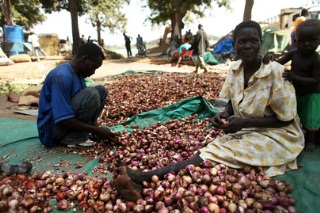Eastern Equatoria state official warns of looming hunger
July 20, 2015 (JUBA) – Thousands of people in South Sudan’s Eastern Equatoria state are likely to face severe hunger due to lack of rainfall and unexpected crop failure, an official told Sudan Tribune Monday.

Chichim said other Eastern Equatoria counties of Magwi, Lafon, Ikotos and Torit also experienced rainfall shortage.
“The first phase of harvest has gone without food crop yields. In greater Kapoeta, the area is completely dry as if we are in dry season,” he said.
“In that aspect, all crops were destroyed and phase one of the [crops] planting had no harvest,” added the agriculture minister.
Situated within the greenbelt of South Sudan, Eastern Equatoria state often experiences sufficient rains, which is expected throughout the year. The greater Equatoria region usually has two farming seasons.
Chichim said a team of experts were dispatched to villages to assess the extent of crop damage for local authorities to take necessary steps.
“There are other alternative that we are giving to our people. Eastern Equatoria is rich with animal resources. We cannot depend on the cereals only. Therefore, we encourage the pastoralists to sell their animals in order to get money and food in markets,” he said.
Threats of hunger are not new in this region given that state authorities had in June reported a case of the catastrophe in Budi county.
Currently, only about 4% of South Sudan’s arable land is reportedly being utilised for agriculture, yet over 70% of the country’s population actively engage in the sector to improve their livelihoods.
In 2013, however, the country’s agriculture and forestry ministry announced plans for a comprehensive master plan, seeking to revive the largely dormant sector, as part of plans to diversify the country’s economy, which largely depends on oil revenues.
(ST)
